Israel At 50: Celebrating the Year of Jubilee
The year 1998 is the Year of Jubilee—the 50th birthday of the State of Israel!
What is going through the minds of Israelis on the state’s 50th birthday? What are the expectations of its citizens?
Since Israel is a nation of immigrants, growing by 11 percent in the last wave of immigration alone, it obviously changes its character continually. Therefore, the expectations of the citizenry are divided according to the various major groups in the country.
What signifies the Jubilee for religious Jews? Secular Jews? Russian or Ethiopian immigrants? Israeli Arabs? Sabras (Israeli-born Jews)?
The Jubilee for Religious Jews
Among Israeli citizens, there are 165,000 Jews (settlers) living in 150 settlements in Judea, Samaria, and the Gaza Strip. Their yearly growth rate is nine percent. Approximately 85 percent of the settlers are under the age of 45, and approximately 50 percent work within the “Green Line.”
Most of the settlers live in these areas because of their ideology. The majority are religious Jews who believe that the country was given to the Jewish people by God and should not be given away. The biblical Year of Jubilee deals with this connection to the God-given land. What could be nicer and more true than to tell people they belong to the land in the Year of Jubilee, particularly in the midst of the peace process, the main slogan of which is “Land for Peace.”
The average religious person is naturally interested in biblically related events, but when it comes to applications, they take their directions from the rabbinical commentaries. They look down on secular Jews and find secularism to be a bankrupt form of life.
What do the religious Jews want from the Year of Jubilee? National repentance and a return to living under the laws of rabbinical Judaism, which is the condition for the Messiah’s coming. He will, of course, bring the long-desired peace. Only then will there be a celebration of Jubilee, which to religious Jews equals freedom.
The Jubilee for Immigrants from the Soviet Union
Since 1989, 750,000 immigrants have come to Israel from the former Soviet Union. Thirty percent are non-Jewish. They comprise 10.6 percent of the total population. Fourteen percent are over 65 years of age. Eleven percent are engineers, and two percent are doctors. Their average age is 36.
This wave of immigration occurred for economic reasons, not because of ideology. In the former Soviet Union, most of these people were rich, well-educated, from a secular background, holding professional or hi-tech positions. When they arrived in Israel, they had to deal with a new language, inadequate jobs, and the attempts of Orthodox Jews to make them more Jewish and thereby influence and restrict their beliefs. Because most Russian immigrants do not find jobs parallel to those they held in the Soviet Union, they receive low wages, compelling them to work long, hard hours. Their large numbers cause many to live within a closed circle—an “island of culture” like a “little Russia” within Israel. For them, the age of the state is of little importance. Their question is, “What’s in it for ME?”
What do the Russian immigrants want from the Year of Jubilee? Better incomes, easier living, and peace for themselves.
The Jubilee for Immigrants from Ethiopia
There are approximately 65,000 immigrants from Ethiopia. Twenty-seven percent are single-parent families with an average of six people each. Eighty percent of the children are educated in government religious schools, and 60 percent are under the age of 18.
The Ethiopian immigration was a rescue operation because they were in danger of annihilation. Upon arrival in Israel, they kissed the “holy ground” and gratefully accepted everything given to them by the state.
Since the Ethiopian immigrants grew up in a country with much different technology than Israel’s, they came with virtually nothing to help integrate them into society and the framework of an occupation. The state invested a great deal of financial resources and effort into their education, in order to integrate them into society as quickly as possible. Their children were taken into religious schools from the very first day—the religious establishment’s way of making sure the new generation would grow up to be “Kosher Jews.”
Although there are some doctors, engineers, etc. among the Ethiopian immigrants, they are few in number. Most work in low-paying jobs and therefore live a minimal lifestyle. This generation of immigrants is going through a difficult integration process in order to give a better start to the next generation.
What do the Ethiopians want from the Year of Jubilee? Everything the rest of the citizens want—only faster!
The Jubilee for the Arab Citizens
There are 1.12 million Israeli Arabs—19 percent of all the nation’s citizens. Fifty percent are under 19 years of age. Twenty-five percent of these families, with an average of five people each, live under the poverty level.
Although these Israeli Arabs live in the State of Israel, their desire is to live in their own independent Arab state. Only a few would dare speak out in favor of the State of Israel. The price of admiration is sometimes their lives!
Israeli Arabs do not serve in the army; it would bring them into too much conflict, and it would be too dangerous for Israel.
Jews and Arabs usually do not live together in housing or even in neighborhoods. There is always a lot of tension and distrust between them. Most of them work in construction or in civilian industry, but not in military industry.
Israeli Arabs have the right to vote. There are Arab Knesset members who are working for the interest of the Palestinian Authority, and not necessarily in the interest of the State of Israel.
The Israeli Arabs, like their brothers under the Palestinian Authority, are celebrating the Year of Jubilee as a year of disaster—50 years since the disaster that befell them in 1948, they claim. At that time, they lost the War of Independence, a war they themselves had started. Many fled or were transferred to neighboring Arab countries. As Moslems whose holy book is the Koran, they are commanded to redeem their land.
What would the Israeli Arabs like in this special Year of Jubilee? Peace, a good income, and a comfortable lifestyle—but with less Israel and more Palestine.
The Jubilee for Sabras
The average Israeli born into a non-religious Jewish family grows up with a minimal knowledge of the Old Testament—just enough to pass the high school final exams. They comprise 40 percent of the population. After three years of military service (two years for girls), they may continue to study for a degree, learn a profession, or immediately enter the world of employment.
Secular citizens are interested in three main topics: continuation of the peace process; economic moderation that “rises” to new low records; and the deep rift between religious and secular Jews.
Based on the national mood, it can be concluded that the Year of Jubilee has turned out to be a year of disillusionment for the Sabras. Many of their chief hopes have not come to pass.
The peace process is not progressing but is, instead, freezing or standing still, a situation that increases the terror attacks and worsens the atmosphere. Because of the tension, there is very little financial investment taking place, which adds to the economic moderation. As of April 1998, there were 164,000 people unemployed. Common sense would dictate that the two major political parties—Labor and Likud—combine to form a unity government, but in Israel, as in many countries, politics and common sense are two separate things.
And, as if the economical, political, and security situations were not bad enough, this year—of all years—the rift between secular and religious Jews is at its worst since the birth of the nation in 1948. Although the religious are in the minority, they too often set the tone for what will occur in the affairs of the secular majority and dictate how it will happen. It is feared that this confrontation may yet cause a dangerous division in the nation.
Since the secular Jews rely on their own power and wisdom to relieve their problems, their morale is very low. They show interest in religious things only out of sheer curiosity—the mystique of it all. In most cases, they are satisfied with short, unbinding answers. There is no real search for spiritual truth or a relationship with God. Their rationale is, “What’s in it for ME?”
With this general attitude, most of the activities and festivities of the Jubilee Year have been self-centered and praise the ego: “What is being done for ME in this Year of Jubilee?”
What do the Sabras want during this Year of Jubilee? To show the rest of the world Israel’s achievements over the last 50 years. It is an absolute must. In this way, they reason, the mood of the people will improve, if only for a brief time.
Celebrating the Year of Jubilee
With this background of the different streams in Israeli society in mind, how are the people celebrating the Year of Jubilee?
The government established a nonprofit organization to plan and oversee the Jubilee and allocated a budget of $52 million for the celebration. How is this budget being used?
As a nation facing enemies all around, terror attacks on a routine basis, unemployment, and a high auto accident rate, many voices have been heard to ask, “Who needs a party? Just give us quiet and peace of mind. This will be the greatest gift for the Jubilee!”
Various ideas were put forth about how to use the budget: building projects for the low-income sector; strengthening education; developing new employment opportunities; landscaping the whole country; building a better highway system. Such projects would guarantee fruit from the Year of Jubilee that would last for years to come, rather than spending it on things that vanish.
On the other hand, there have been voices calling for a celebration. “The $52 million will not take away all our troubles,” they say, “but there is a place for celebration.” Events have been organized: exhibitions, displays of 50 years of history, parades, school and kindergarten parties, presentation of awards, salutation of military personnel, memorial services, etc.
In summary, the trend is to think, “We are 50 years old. Look at how well we have done and how much we have achieved in our own power!” This conclusion is frightening. In the words of King Solomon, “Pride goeth before destruction, and an haughty spirit before a fall” (Prov. 16:18). And there is the clear warning of the Prophet Micah, “walk humbly with thy God” (Mic. 6:8).
Because most Israelis do not put God in the center of their lives, all the events of the Jubilee are concentrated around the people themselves and their own welfare, rather than around the knowledge of God and His great presence among them.
The Year of Jubilee signifies unity, freedom, and peace. Unfortunately, this particular Year of Jubilee now stands under a banner of division and disagreement!
The leading Israeli newspaper gave this clear, concise picture of the official Jubilee slogan:
Together with Pride—Together with Hope.
How does the individual act?
With pride—of course!
With hope—why not?
Together—as long as it’s ME first!
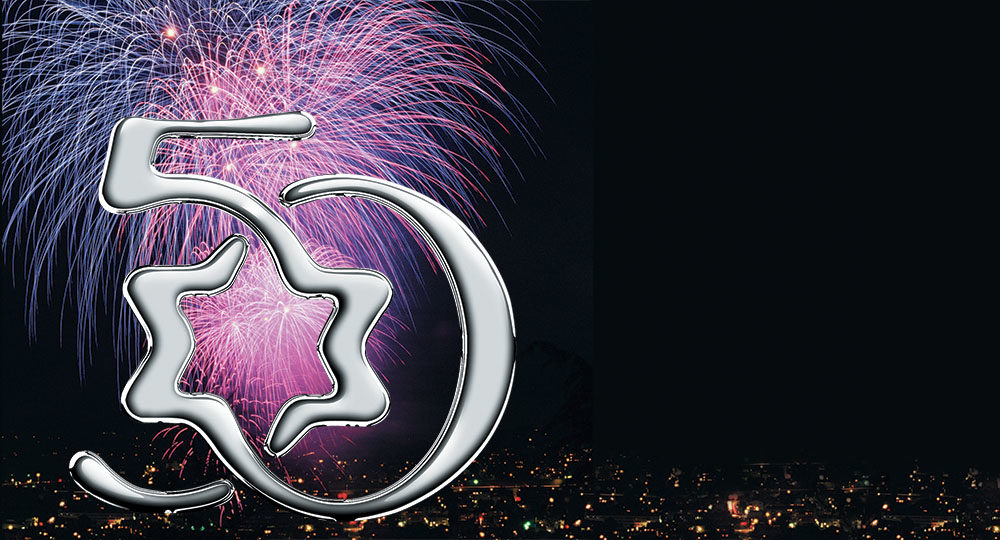

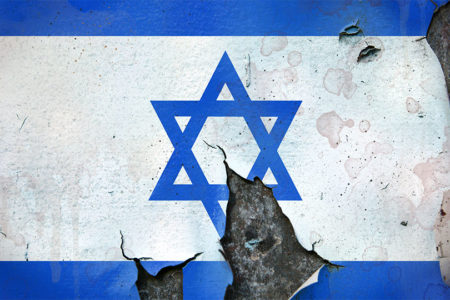
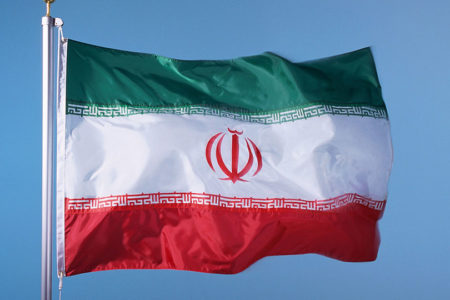
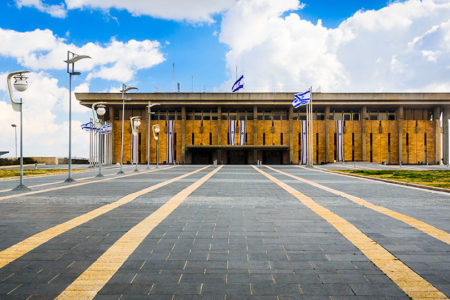
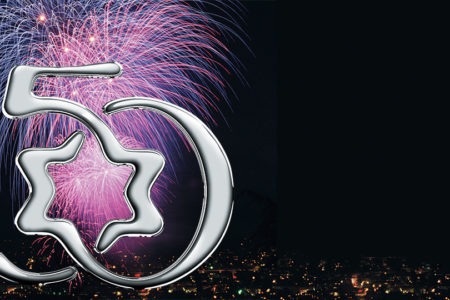

Thank you for this clear, concise history of the year of Jubilee’s impact (or lack of it) in the lives of those living in Israel. I am a Gentile who loves Yeshua with all my heart. I want to learn more about Him and how to be like HIm. I do pray for the peace of Jerusalem.